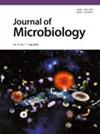Rab GTPases 在细菌逃离宿主细胞囊泡运输过程中的作用
IF 3.3
4区 生物学
Q2 MICROBIOLOGY
引用次数: 0
摘要
大多数细菌会利用其毒素与宿主细胞相互作用,对细胞造成损害,然后从细胞中逃逸。细菌进入细胞后,将通过内体途径进行转运。Rab GTPases 作为内体的主要成分参与了细菌的运输,并与其下游效应蛋白结合。细菌操纵一些 Rab GTPases,逃离细胞,并获得生存。在这篇综述中,我们将重点总结细菌如何操纵 Rab GTPases 来控制其逃逸的诸多过程。本文章由计算机程序翻译,如有差异,请以英文原文为准。

Role of Rab GTPases in Bacteria Escaping from Vesicle Trafficking of Host Cells.
Most bacteria will use their toxins to interact with the host cell, causing damage to the cell and then escaping from it. When bacteria enter the cell, they will be transported via the endosomal pathway. Rab GTPases are involved in bacterial transport as major components of endosomes that bind to their downstream effector proteins. The bacteria manipulate some Rab GTPases, escape the cell, and get to survive. In this review, we will focus on summarizing the many processes of how bacteria manipulate Rab GTPases to control their escape.
求助全文
通过发布文献求助,成功后即可免费获取论文全文。
去求助
来源期刊

Journal of Microbiology
生物-微生物学
CiteScore
5.70
自引率
3.30%
发文量
0
审稿时长
3 months
期刊介绍:
Publishes papers that deal with research on microorganisms, including archaea, bacteria, yeasts, fungi, microalgae, protozoa, and simple eukaryotic microorganisms. Topics considered for publication include Microbial Systematics, Evolutionary Microbiology, Microbial Ecology, Environmental Microbiology, Microbial Genetics, Genomics, Molecular Biology, Microbial Physiology, Biochemistry, Microbial Pathogenesis, Host-Microbe Interaction, Systems Microbiology, Synthetic Microbiology, Bioinformatics and Virology. Manuscripts dealing with simple identification of microorganism(s), cloning of a known gene and its expression in a microbial host, and clinical statistics will not be considered for publication by JM.
 求助内容:
求助内容: 应助结果提醒方式:
应助结果提醒方式:


